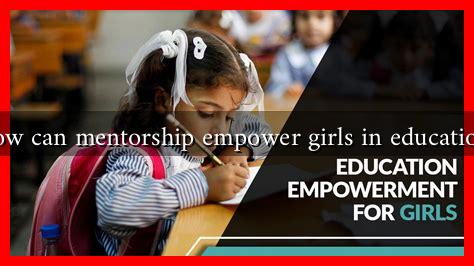-
Table of Contents
How Can Mentorship Empower Girls in Education?
Mentorship plays a crucial role in shaping the educational experiences and outcomes of girls around the world. As barriers to education continue to exist, particularly in developing regions, mentorship can serve as a powerful tool to empower girls, enhance their academic performance, and foster their personal growth. This article explores the multifaceted ways in which mentorship can positively impact girls in education, supported by relevant examples and statistics.
The Importance of Mentorship in Education
Mentorship is defined as a relationship in which a more experienced or knowledgeable person guides a less experienced individual. In the context of education, mentors can provide invaluable support, encouragement, and resources to help girls navigate their academic journeys. The importance of mentorship can be summarized as follows:
- Emotional Support: Mentors can offer emotional guidance, helping girls build confidence and resilience in the face of challenges.
- Academic Guidance: Mentors can assist with academic planning, study strategies, and subject-specific tutoring.
- Networking Opportunities: Mentors can introduce girls to professional networks, opening doors to internships and career opportunities.
- Role Models: Female mentors serve as role models, demonstrating that success in education and careers is achievable.
Case Studies: Successful Mentorship Programs
Several organizations have successfully implemented mentorship programs that empower girls in education. Here are a few notable examples:
1. Girls Who Code
Girls Who Code is a nonprofit organization that aims to close the gender gap in technology. Through its mentorship program, girls are paired with female tech professionals who provide guidance, support, and encouragement. According to their data, 90% of participants reported feeling more confident in their coding skills after engaging with a mentor.
2. Big Brothers Big Sisters
This well-known mentoring organization has a specific focus on empowering girls through one-on-one mentorship. Studies show that girls who participate in the program are 46% more likely to hold leadership positions and 55% more likely to enroll in college compared to their peers without mentors.
3. The Girl Scouts
The Girl Scouts organization emphasizes mentorship through its troop leaders, who guide girls in various activities that promote leadership, community service, and personal development. Research indicates that Girl Scouts are more likely to pursue STEM careers and engage in community leadership roles.
Statistics Highlighting the Impact of Mentorship
Research consistently shows that mentorship has a significant impact on girls’ educational outcomes. Here are some compelling statistics:
- According to a study by the National Mentoring Partnership, mentored youth are 55% more likely to enroll in college.
- A report from the American Association of University Women found that girls with mentors are more likely to pursue STEM fields, with 74% expressing interest in these areas.
- Research from the University of California, Los Angeles, indicates that girls with mentors have higher self-esteem and better academic performance.
Challenges and Solutions in Mentorship
While mentorship can be transformative, several challenges can hinder its effectiveness:
- Access to Mentors: In many regions, especially rural or underserved areas, there is a lack of available mentors.
- Training for Mentors: Not all mentors are equipped with the skills necessary to provide effective guidance.
- Retention of Mentors: High turnover rates can disrupt the continuity of mentorship relationships.
To address these challenges, organizations can:
- Utilize technology to connect mentors and mentees remotely.
- Provide training programs for mentors to enhance their skills.
- Implement structured mentorship programs that encourage long-term relationships.
Conclusion
Mentorship is a powerful tool that can significantly empower girls in education. By providing emotional support, academic guidance, and networking opportunities, mentors can help girls overcome barriers and achieve their educational goals. Successful mentorship programs, such as Girls Who Code and Big Brothers Big Sisters, demonstrate the profound impact that mentorship can have on girls’ lives. As we continue to advocate for gender equality in education, it is essential to recognize and invest in mentorship as a means to empower the next generation of female leaders.
For more information on mentorship programs and their impact, visit Mentoring.org.


